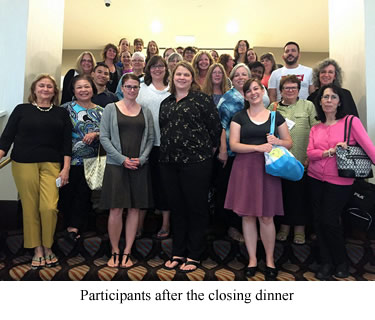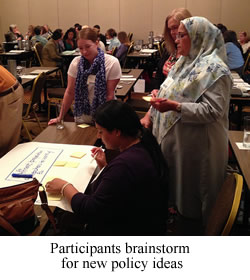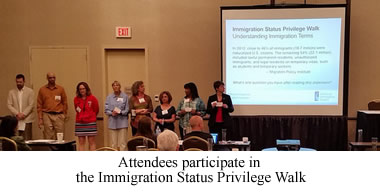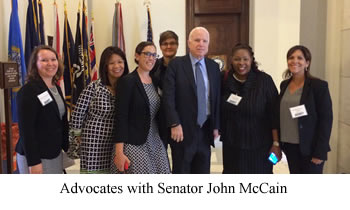|
 This past June, TESOL held its 10th annual Advocacy & Policy Summit, bringing more than 75 TESOL professionals from all over the United States, including representatives from 31 affiliates, to Washington, DC. This year’s summit was supported in part by TESOL’s event partners, Corwin Press and Houghton Mifflin Harcourt, as well as TESOL’s strategic partner, the American Federation of Teachers (AFT). This past June, TESOL held its 10th annual Advocacy & Policy Summit, bringing more than 75 TESOL professionals from all over the United States, including representatives from 31 affiliates, to Washington, DC. This year’s summit was supported in part by TESOL’s event partners, Corwin Press and Houghton Mifflin Harcourt, as well as TESOL’s strategic partner, the American Federation of Teachers (AFT).
The summit equips TESOL professionals with the tools to become influential advocates on behalf of English learners (ELs) and provides the knowledge of key education policies. Attendees spent 3 days learning from policy experts, networking with TESOL professionals, and understanding effective advocacy techniques and strategies. The summit culminated in more than 100 meetings with senators, representatives, and staffers on Capitol Hill.

The first part of the summit centered on policy updates and breakout sessions from a number of key organizations, including TESOL International Association, the U.S. Department of Education’s Office of English Language Acquisition (OELA) and Office of Career, Technical and Adult Education (OCTAE), the Department of Homeland Security’s Student Exchange and Visitor Program, the Migration Policy Institute, and the Migrant Legal Action Program.
After starting the summit with a general legislative update, Acting Assistant Secretary for Career, Technical and Adult Education Johan Uvin addressed the audience with a keynote presentation on OCTAE’s current projects and policy initiatives. Mr. Uvin, once an English learner himself, spoke in great detail about the department’s efforts in implementing the Workforce Innovation and Opportunity Act, and how the law will help improve the job training and education of thousands of adult ELs across the country.
Following Mr. Uvin’s presentation, attendees enjoyed a luncheon keynote given by Sylvia Acevedo, an engineer and business leader who, among many other prestigious accomplishments and positions, was appointed by President Obama to the White House Commission for Educational Excellence for Hispanics. Ms. Acevedo discussed her experience and lessons learned from her work in community engagement, and the recent work by the commission in developing the White House policy statement on support for young dual-language learners.
The afternoon saw a series of breakout sessions focused on rights of immigrant students, advocacy for educators, Deferred Action for Childhood Arrivals (DACA) and Deferred Action for Parents of Americans and Lawful Permanent Residents (DAPA), and the impact of the new Workforce Innovation Opportunity Act. The day concluded with a deep dive on the Every Student Succeeds Act (ESSA), the successor to the No Child Left Behind Act.

To kick off the summit’s second day, Diane Staehr Fenner, EL advocate and author of Advocating for English Learners: A Guide for Educators, addressed the summit audience with a morning keynote, where she presented major findings and recommendations stemming from TESOL’s latest report, “The Preparation of the ESL Educator in the Era of College and Career Readiness Standards.”
Following Ms. Staehr Fenner’s presentation, representatives from OELA and the Office for Civil Rights and the U.S. Department of Education copresented on the work their offices are doing around ESSA and the civil rights of ELLs. Part of their presentation focused on the resources provided by their offices, such as the toolkit for educators working with ELLs, and the public data collection that illustrates how school districts are doing on civil rights obligations under the law.
The remainder of the morning offered up various breakout sessions, where a number of organizations provided informative and interactive presentations. During one breakout session facilitated by the American Immigration Council, attendees participated in the “immigration privilege status walk,” based on a freely available lesson plan (PDF), which helped show the benefits and limitations associated with different immigration statuses.

Before the advocacy training session began, attendees enjoyed lunch, along with the opportunity to expand their professional networks and meet fellow TESOL professionals. Attendees spent Monday afternoon preparing for their meetings on Capitol Hill, where they learned about current legislation in Congress affecting ELs and educators, as well as tips on how to effectively hold meetings and discuss EL issues with members of Congress and their staffers. Throughout the afternoon, participants worked in small groups, often with peers from the same state, where they strategized for their meetings on the Hill.
On Tuesday, summit participants flocked to Capitol Hill, meeting with their representatives in the House and Senate. Many participants from the same state met with their representatives as a group, in a concerted effort to advocate on behalf of ELs and fellow educators from their home state. After crisscrossing the Capitol grounds and walking for miles through the hallways of the House and Senate office buildings, participants gathered for one last dinner, where they shared their experiences after a long day of advocating.

Jacqueline Cunningham shared,
When we met with the congressman’s staff, we were told that we were the only people to ever come to Representative Gutierrez’s office to speak on behalf of Chinese students. We had a great conversation and received very interesting feedback.
Kristina Herman-Hill summed up her day by saying,
I learned that the people I most dreaded to meet, were the best. Out of the five meetings we had, three staffers were former EL students. We were able to share information with Representative Kline’s staffers, who really wanted to see what they could do for us before he left office to retire. We planted a lot of good seeds today, now we have to go home and cultivate them.
For more highlights from the summit, be sure to visit the 2016 TESOL Advocacy & Policy Summit page and mark your calendars for the 2017 TESOL Advocacy & Policy Summit 18–20 June 2017 in Washington, DC.
|